
INTERNATIONAL PSYCHOGERIATRICS
Scope & Guideline
Pioneering Research for Healthier Aging
Introduction
Aims and Scopes
- Psychogeriatric Interventions and Treatments:
The journal emphasizes innovative psychogeriatric interventions, exploring both pharmacological and non-pharmacological treatments for mental health issues in older adults, including depression, anxiety, and neurocognitive disorders. - Aging and Cognitive Decline:
Research on cognitive decline associated with aging, including studies on mild cognitive impairment, dementia, and the neurobiological underpinnings of these conditions, is a core focus. - Social Determinants of Mental Health:
The journal addresses how social factors, such as loneliness, social support, and community engagement, impact mental health outcomes in older adults. - Cultural and Ethnic Considerations:
There is a consistent exploration of how cultural and ethnic backgrounds influence mental health perceptions, care practices, and outcomes for older adults. - Policy and Practice in Geriatric Care:
The journal includes discussions on policy implications and practice guidelines to improve care for older adults, particularly those with mental health conditions. - Trauma and Resilience in Older Adults:
Research on the effects of trauma, including childhood trauma, and how resilience factors can mitigate mental health challenges in older populations.
Trending and Emerging
- Holistic and Integrative Care Models:
There is an increasing emphasis on holistic care models that integrate mental, physical, and social health, reflecting a shift towards comprehensive approaches to geriatric care. - Technology in Mental Health Interventions:
Research exploring the use of technology, including telehealth and digital interventions for mental health support, is gaining traction, particularly in response to the COVID-19 pandemic. - Focus on Loneliness and Social Isolation:
The impact of loneliness and social isolation on mental health has emerged as a significant theme, with studies examining intervention strategies to enhance social connectivity among older adults. - Resilience and Coping Mechanisms:
There is a growing interest in resilience factors and coping mechanisms that contribute to better mental health outcomes in older adults, particularly in the context of trauma and life transitions. - Cultural Competence in Geriatric Care:
Increasingly, research is addressing the need for culturally competent practices in geriatric care, focusing on how cultural factors influence mental health treatment and outcomes. - Interdisciplinary Approaches to Psychogeriatrics:
Emerging interdisciplinary research that bridges psychology, psychiatry, social work, and gerontology is becoming more prominent, highlighting the need for collaborative care models.
Declining or Waning
- Traditional Pharmacological Approaches:
There is a noticeable reduction in studies focusing solely on traditional pharmacological treatments for mental health issues in older adults, with a shift towards integrated and holistic approaches. - Age-Based Stereotyping in Mental Health:
Research specifically addressing ageism and its direct impacts on mental health care has become less prominent, as the journal pivots towards more nuanced discussions of social determinants. - Generalized Studies on Depression:
While depression remains a key area, the broad, generalized studies on depression without specific contextual factors (like cultural or social influences) are appearing less frequently. - Elder Abuse and Neglect:
Although still relevant, the focus on elder abuse and neglect has decreased, possibly as the journal shifts towards more preventative and supportive care models.
Similar Journals
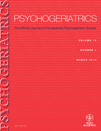
Psychogeriatrics
Bridging gaps in geriatric psychiatry knowledge.Psychogeriatrics is a leading peer-reviewed journal published by WILEY, dedicated to advancing the understanding of mental health and geriatric psychiatry. With an ISSN of 1346-3500 and an E-ISSN of 1479-8301, this journal has been integral to the field since its inception in 2005 and continues to publish cutting-edge research until 2024. Recognized for its impact, Psychogeriatrics holds a commendable Q2 quartile ranking in Geriatrics and Gerontology, Gerontology, and Psychiatry and Mental Health as of 2023. The journal's Scopus rankings reflect its significant contribution to Nursing Gerontology, Medicine Psychiatry and Mental Health, and Medicine Geriatrics and Gerontology. Although it operates with no open access options, Psychogeriatrics remains a vital resource for researchers, professionals, and students who are exploring the complexities of mental health in older populations. The journal not only disseminates innovative research but also tackles pressing issues related to the psychological well-being of the elderly, making it essential reading for anyone focused on improving geriatric mental health care.
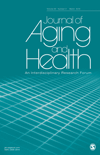
JOURNAL OF AGING AND HEALTH
Connecting research and policy for aging excellence.The JOURNAL OF AGING AND HEALTH, published by SAGE PUBLICATIONS INC, is a preeminent peer-reviewed journal dedicated to advancing research in the field of gerontology and related disciplines. With an impressive impact factor and ranked Q1 across multiple categories including Community and Home Care, Geriatrics and Gerontology, and Health (Social Science), this journal has established itself as a vital resource for academics, clinicians, and policymakers alike. Spanning over three decades of publication from 1989 to 2024, it serves as a platform for innovative research and multifaceted discussions on aging, health, and the interplay of social factors influencing the elderly population. The journal's rigorous standards for publication ensure high-quality contributions that are impactful and relevant, making it an essential read for those dedicated to improving the health and quality of life for older adults. Although it is not an open-access journal, it provides comprehensive insights that are critical to understanding the complexities of aging in today's society.

Canadian Geriatrics Journal
Shaping the future of geriatric care through open access.Canadian Geriatrics Journal, published by MULTIMED INC, is a prominent platform dedicated to advancing the field of geriatrics and gerontology. With its esteemed status as a Q2 journal in both Geriatrics and Gerontology categories for 2023, it ranks favorably within the academic community, holding a 73rd percentile in Nursing Gerontology and a 59th percentile in Medicine Geriatrics and Gerontology according to Scopus metrics. Since its inception in 2011, the journal has aimed to foster innovation and disseminate pivotal research that addresses the complexities of aging populations. Researchers, healthcare professionals, and students interested in the intricacies of geriatric care will find a wealth of open-access resources that contribute significantly to enhancing practice and care methodologies in Canada and beyond. With its address located at 66 Martin St, Toronto, ON L9T 2R2, Canada, the journal stands as a vital resource for stakeholders in the geriatric field.

Journal of Gerontology and Geriatrics
Enhancing Global Conversations on AgingJournal of Gerontology and Geriatrics, published by PACINI EDITORE, is a crucial resource for those dedicated to the study of aging and geriatric health. Since its inception in 2016, this journal has aimed to disseminate high-quality research and findings that address the intricate biological, social, and psychological aspects of aging. With ISSN 2499-6564 and E-ISSN 2499-6564, it strives to foster discussions that enhance our understanding of gerontology and geriatrics on a global scale, despite its current positioning in the Q4 quartile of academic rankings. Located in Pisa, Italy, the journal invites contributions from researchers, professionals, and students who are passionate about advancing knowledge in these critical fields. Although it currently does not offer open access, the journal plays a vital role in connecting the community with essential insights that guide both research and practice in geriatric care.
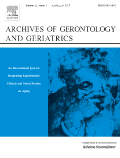
ARCHIVES OF GERONTOLOGY AND GERIATRICS
Empowering research for a healthier aging society.The Archives of Gerontology and Geriatrics, published by Elsevier Ireland Ltd, is a leading journal in the fields of Aging and Geriatrics and Gerontology. With an ISSN of 0167-4943 and an E-ISSN of 1872-6976, it has established itself as a crucial platform for disseminating high-quality research focused on the biological and psychosocial aspects of aging. The journal holds an impressive Q2 ranking in both Aging and Geriatrics and Gerontology, and a Q1 ranking in Gerontology and Health (Social Science) as of 2023, reflecting its significant impact in these disciplines. Additionally, the journal is ranked #33/371 in Social Sciences (Health) and #5/39 in Nursing (Gerontology) according to Scopus, showcasing its esteemed position in the academic community. Although currently not open access, the journal offers a wealth of research articles from 1982 to the upcoming 2025 that are vital for stakeholders including researchers, healthcare professionals, and students aiming to advance their understanding of aging processes and policies. Titles published within its pages contribute to shaping agendas in public health and gerontological practice, making it an essential resource for those involved in the study of the elderly population.

European Review of Aging and Physical Activity
Empowering healthier aging through physical engagement.European Review of Aging and Physical Activity is a leading peer-reviewed journal published by SPRINGER HEIDELBERG, focusing on the intersection of gerontology and physical activity. With an impact factor placing it in the Q1 category for Geriatrics and Gerontology, this journal serves as a vital resource for researchers, healthcare professionals, and students dedicated to advancing the understanding of how physical activity influences aging. Open Access since 2015, it provides broad accessibility to its high-quality research, ensuring that pivotal findings are available to a global audience. The journal's Scopus ranking further underscores its impact, being positioned at #17 out of 116 in the field of Geriatrics and Gerontology, placing it in the 85th percentile. Published from Germany, the European Review of Aging and Physical Activity continues to address pertinent issues in the field, facilitating discourse and innovation for better health outcomes in aging populations.
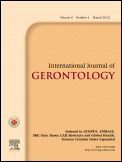
International Journal of Gerontology
Elevating the discourse on aging and its implications.International Journal of Gerontology is a distinguished peer-reviewed journal dedicated to advancing the field of gerontology and addressing the multifaceted challenges associated with aging. Published by the Taiwan Society of Geriatric Emergency & Critical Care Medicine, this innovative journal has been an open-access platform since 2018, ensuring that vital research is accessible to a global audience. With an ISSN of 1873-9598, it serves as a crucial resource for researchers and practitioners focused on the biological, psychological, and social aspects of aging. The journal is indexed in Scopus with a rank of #103/116 in the Medicine category (Geriatrics and Gerontology) as of 2023, placing it in the Q4 quartile—a testament to its evolving impact in the field. Spanning works published from 2007 to 2024, the International Journal of Gerontology facilitates the dissemination of critical research findings and clinical practices that inform and enhance geriatric care and research methodologies.

EXPERIMENTAL AGING RESEARCH
Pioneering Insights into the Aging ProcessEXPERIMENTAL AGING RESEARCH, published by Taylor & Francis Inc., is a leading journal that has been at the forefront of aging research since its inception in 1975. With an ISSN of 0361-073X and an E-ISSN of 1096-4657, this journal has earned a notable reputation, including a Q3 ranking in the field of Aging and impressive Q1 and Q2 rankings in Arts and Humanities and Geriatrics and Gerontology respectively. This positions the journal within the top percentile of its category, highlighting its significant impact and contribution to the scientific community. Covering a broad scope that intersects various disciplines, EXPERIMENTAL AGING RESEARCH aims to disseminate pioneering research, foster interdisciplinary collaboration, and provide a platform for innovative studies that enhance understanding of the aging process. While it currently does not offer Open Access, researchers and academics can access its rich repository of knowledge that spans multiple facets of aging, from physiological changes to psychological impacts. As the field of aging continues to evolve, this journal remains an essential resource for researchers, professionals, and students dedicated to advancing knowledge and practices concerning aging and longevity.
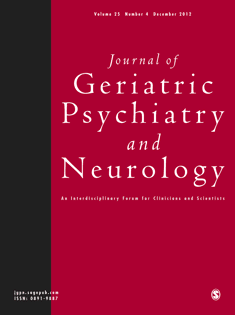
JOURNAL OF GERIATRIC PSYCHIATRY AND NEUROLOGY
Elevating standards in geriatric psychiatry research.JOURNAL OF GERIATRIC PSYCHIATRY AND NEUROLOGY, published by SAGE PUBLICATIONS INC, is a premier academic journal dedicated to advancing the understanding of mental health issues and neurological disorders in the aging population. With an established presence since 1988, this journal stands out in the fields of Geriatrics, Gerontology, Neurology, and Psychiatry, currently positioned in the Q2 category based on 2023 metrics, reflecting its influence and academic rigor. The journal is indexed in major databases and is highly regarded for its contributions, as evidenced by its strong Scopus rankings. It serves as an essential resource for researchers, clinicians, and students, offering insightful articles that explore the complex interplay between aging, mental health, and neurological conditions. Although it does not provide open access, it continues to be a vital source of scholarly knowledge for those dedicated to enhancing the well-being of the elderly population.

Geriatrics
Uncovering the complexities of aging with impactful research.Geriatrics is a leading academic journal committed to advancing the understanding and research within the expansive field of gerontology and geriatric medicine. Published by MDPI since 2016 and featuring an Open Access model, this journal aims to disseminate high-quality research that addresses the challenges and opportunities associated with aging populations. Based in Switzerland, Geriatrics has rapidly gained recognition, achieving notable rankings in various categories such as Q2 in Gerontology and Q3 in both Aging and Geriatrics and Gerontology, making its contributions significant within the scholarly community. The journal welcomes original articles, reviews, and case studies, focusing not only on clinical aspects but also on social science perspectives related to health. Researchers and professionals in the field will find this journal a vital resource for the latest insights and trends that are crucial to improving elderly care and enhancing quality of life for aging individuals globally. With its commitment to open access, Geriatrics ensures that crucial research findings are readily available to all stakeholders, thus promoting informed dialogue and collaboration across disciplines.